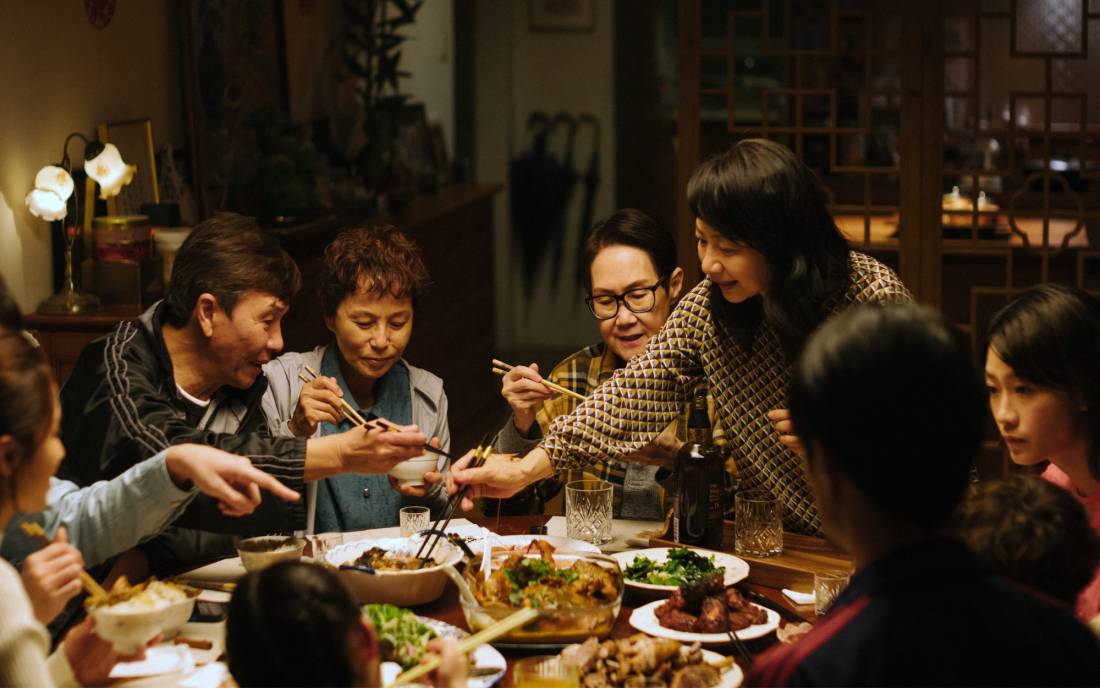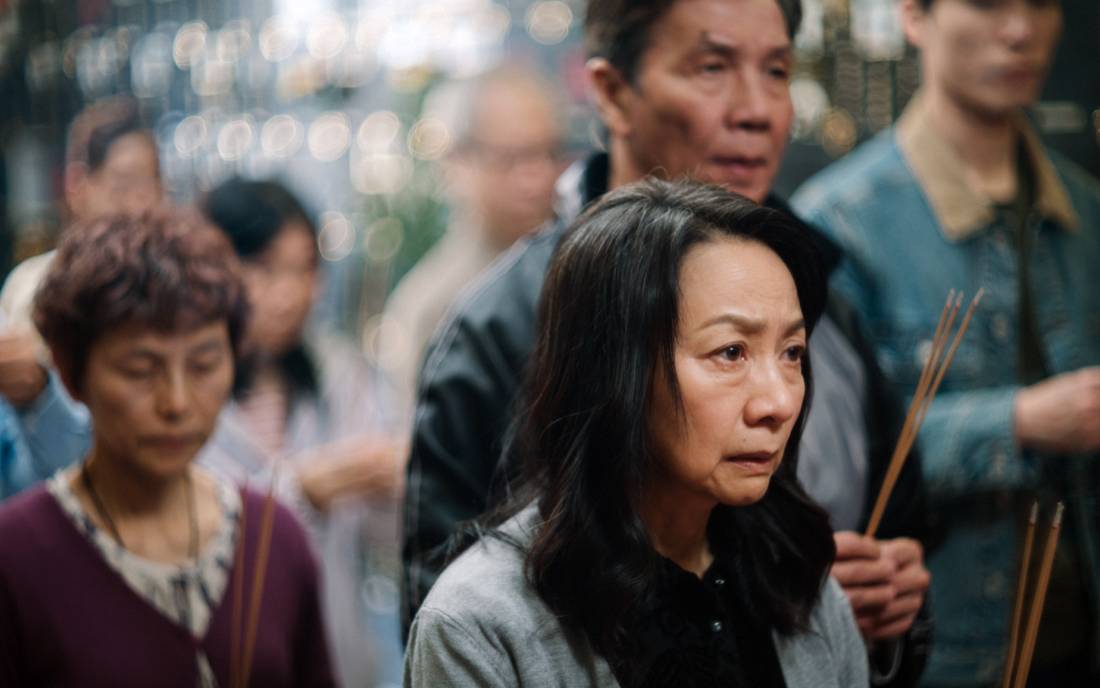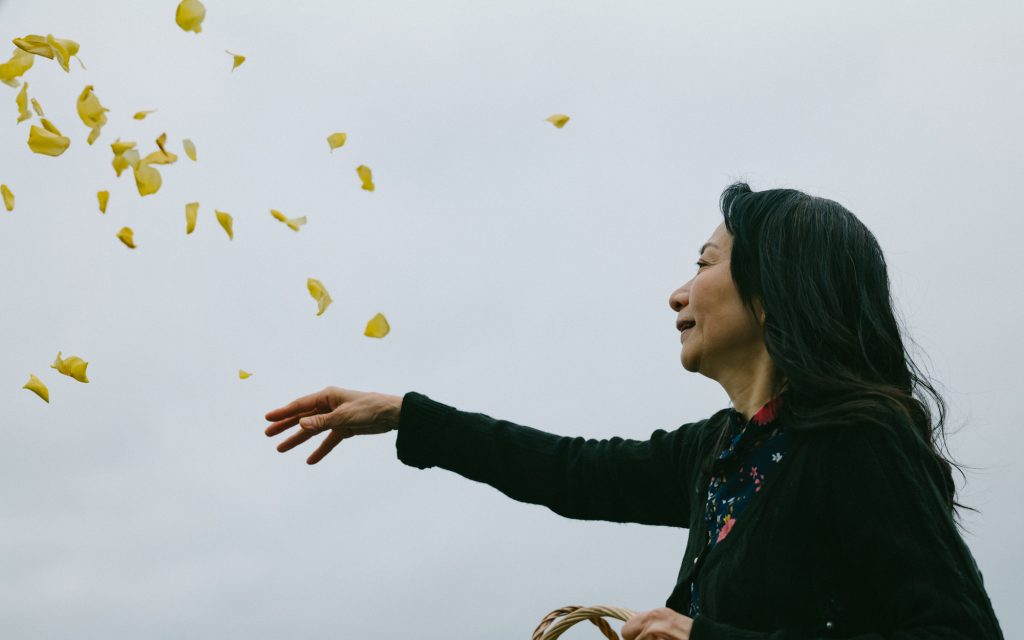‘All Shall Be Well’ grapples with fairness, inclusion

“All Shall Be Well” (“Cong jin yihou”) (2024). Cast: Patra Au, Maggie Li Lin Lin, Tai-Bo, Ho So-Ying, Chung-Hang Leung, Fish Liew Chi Yu, Yung Ting Rachel Leung, Chai-Ming Lai, Cheng Cheuck Lam, Kiana Ng Ki Yan, Wah-Wo Wang, Luna Shaw Mei Kwan, Leung Si, Ting Yu. Director: Ray Yeung. Screenplay: Ray Yeung. Web site. Trailer.

Through frequent gatherings of Angie, Pat and her extended family, they enjoy plenty of good food, good times and good company. However, when Pat unexpectedly dies, matters become complicated, particularly when it comes to acknowledging Angie’s relation to her late partner. That includes such issues as deciding on the final disposition of the couple’s considerable assets, including those Angie jointly held with her beloved, but most of which were officially in Pat’s name. These circumstances are made all the more complicated by the fact that Pat had no will, leaving Angie financially vulnerable, even her ability to lawfully remain in the residence she has called home for three decades.
Pat’s relatives also try to run roughshod over Angie when it comes to the handling of Pat’s remains. Before her passing, Pat made it clear that she wished for her ashes to be scattered at sea, a long-held and long-cherished dream. However, when Angie attempts to follow through on fulfilling that request, she’s rebuffed when Pat’s family intervenes. They reject Pat’s wishes in deference to the recommendation of a pompous, know-it-all holy man, Master Yu (Wah-Wo Wang), who insists that placing her ashes in a mausoleum in a crowded city neighborhood is a better and more spiritually appropriate option. And, to add insult to injury, when Pat’s remains are interred during a ceremony at the mausoleum, she’s coldly pushed to the back of the crowd of mourners when Master Yu tactlessly asserts that the spaces up front are reserved “for family members only.”
Relations between Angie and Pat’s relatives thus become progressively more strained, if not downright ugly, with a woman they’ve long seemed to tacitly accept as a member of the family. This becomes most apparent when Pat’s relations try to grab all they can from her estate in an effort to solve the many fiscal problems that they’ve brought upon themselves, actions rife with hypocritical elements even from the assumed allies Angie thought she could most count on. There’s little that Angie can do, too, as her lawyer (Luna Shaw Mei Kwan) observes when she seeks to forestall the actions of Pat’s family, none of which are technically illegal but all of which raise ethical questions to which they all seem willing to turn a blind eye.

As all of this plays out, viewers witness the stark contrast that exists between the loving, mutually supportive bond that the couple forged with one another and the crass, uncaring sense of entitlement that Pat’s relatives have sought to exercise for themselves, regardless of how this might impact others. To make matters worse, Pat’s family members even appear to be quietly aware on some level that what they’re doing is wrong, especially in light of the long amicable relationship they’ve had with Angie. Through this, their largely failed attempts at successfully establishing a supposedly loving, healthy and compassionate family come shining through, a comparison deftly and sensitively yet candidly presented by the filmmaker.
These are conditions to which Angie can likely well attest. Despite what seemed like years of acceptance by her partner’s family, she finds out differently when Pat dies. In deciding on how to address the questions of Pat’s assets and remains, her family defaults to long-established traditions that leave Angie out in the cold. Their beliefs and actions genuinely reflect the aforementioned notion of blood being thicker than water, especially when it comes to matters like Pat and Angie’s relationship – an arrangement that falls outside the mainstream of social traditionalism. At bottom, their partnership is quietly treated as one more of polite tolerance than sincere recognition, making it all too easy and convenient for Pat’s family to brush Angie aside when it comes to carrying out the practices and conventions generally associated with settling an estate and paying so-called “proper” respect for the dead. What’s more, even those who appear to demonstrate a greater degree of open-mindedness to alternate possibilities (i.e., Pat’s niece and nephew) end up capitulating to socially accepted expectations when the time for decisions comes, especially in the wake of the pressure to conform that’s no doubt put upon them by older relations firmly bought in to more conventional views.
Angie, meanwhile, is left holding the bag in this scenario as a result of the beliefs held by others. Her recourse is extremely limited, especially when all of the others involved in this situation are in concurrence about how to proceed. It’s bad enough that she’s lost the love of her life, but now she also must address these other distressing considerations, some of which clearly carry serious implications for her own well-being and the nature of her future.

In light of that, then, is it even realistic to think that things could be any different? That’s a tough question. Practically speaking, many would probably say no. However, theoretically, given the nature of how we make use of our beliefs in materializing our existence, the answer should be a resounding yes. But, considering what’s in place here, how can that happen?
Because we always have access to an infinite range of possibilities when it comes to the beliefs we embrace, we can opt to choose different notions from the ones that we may have selected previously. Granted, their unconventionality may meet with pushback, but that’s not to suggest that such opposition can’t be overcome. So how can this be addressed?
In many respects, this requires understanding the prevailing beliefs already in place and trying to figure out how they can reshaped. It also calls for examining belief combinations that could foster change with some simple tweaking or modest adjustment. For instance, Pat’s family may be acting as they are because they believe in following tradition in circumstances like these. However, upon close examination of these beliefs, one might find that there are overriding, underlying core ideas at work that are ultimately more formidable and determinative than those governing the unfolding of the situation’s specific tangible aspects. For example, the beliefs behind the relatives’ actions are inherently more limiting than what’s potentially possible, and, by embracing beliefs rooted in the concept of limitation, they may be willfully cutting themselves off from devising or considering other, less restrictive possibilities. A mindset where limitation is given license over everything it touches, then, generally works to keep alternative responses off the table. And that, in turn, enables Pat’s family to purposely exclude Angie from the conversation of how matters concerning their loved one are handled.
But is this a dead end? Not necessarily. If Pat’s family members could open their minds to get past the rigidity of limitation and consider different options, there just might be room at the table for Angie in having a say in how circumstances unfold. Indeed, that possibility is always open if Pat’s family allows it, thereby enabling a different outcome to materialize. This is where Victor and Fanny’s more enlightened viewpoints, for instance, could have tremendous impact if they want it to. The influence of these younger, more free-thinking individuals on their older, more conventional parents could turn the tide in favor of their beloved Auntie Angie so that everyone comes away from this scenario satisfied with the results. The key question, of course, is, are they willing to expand their consciousness enough to see this as a viable option and then act upon it?
Changes in the thinking of Pat’s family members are not all that’s involved here, though. A degree of responsibility in this respect should have fallen on Pat and Angie themselves. Because they were partners in a relationship that’s not exactly mainstream in nature, they should have been more cognizant in taking steps to protect themselves from the ramifications involved in a potential eventuality like this. In a very practical sense, this would have meant embracing beliefs behind such matters as making sure that their bases were properly covered legally, namely, by spelling out their wishes in documents like a will. While it’s true that Pat apparently died at a younger age than she expected, one could argue that she nevertheless should have taken steps to safeguard her and Angie’s well-being as a precautionary measure. This, in turn, might have also involved addressing any number of other related beliefs that could have impinged on this undertaking, such as wishful thinking that such an eventuality might never happen, a fear of dying, or a reluctance to become involved in creating an unpleasant, though necessary, plan for succession. Some might call this an unfair criticism, one driven by hindsight, but, for those living under non-traditional conditions like these, it could spell the difference between a harmonious outcome and the heartache, frustration and disappointment of not being suitably prepared.

Itʼs a safe bet that many of us would likely rather avoid discussions like this. But we must also accept the notion that death is a fact of life, a common fate that we’ll all ultimately face. So, because of that, it would be prudent of us to be realistic about this eventuality and plan for it ahead of time, particularly if we’re concerned about ensuring that the aforementioned equality, fairness and inclusion concerns are accounted for. It’s no mistake that estate planners talk about the importance of needing to take care of our “final wishes,” as they’re exactly what the name implies. If we desire to leave this life with peace of mind, we must believe in and act upon everything that’s associated with achieving that goal so that it’s properly achieved when the time comes.
While the story in this film may not be especially original (as many in the LGBTQ+ community can attest), director Ray Yeung’s latest nevertheless serves up a valuable cautionary tale that packs quite a powerful emotional punch. That’s made possible in large part by the stellar performances of the excellent ensemble cast, backed by beautiful cinematography and a subdued atmospheric background score. Admittedly, the pacing can be a tad slow in spots and the presentation of the material may occasionally be a little too “deliberate” for its own good. Nonetheless, “All Shall Be Well” is, without a doubt, one of last year’s underrated gems, a film that will both move and incense audiences, particularly when it comes to distinguishing what’s legally permissible and what’s ethically proper, especially in matters of love and what constitutes “family,” particularly at a time when these considerations come to the forefront in the wake of what happens. The film is available for streaming online.
Most of us are undoubtedly aware of the expression “love is love,” and it’s something that we rightly believe we’re all entitled to, no matter who we might choose as a partner. It’s a concept to which we also believe we should unquestioningly be afforded the rights to equality, fairness and inclusion, particularly at such a sorrowful time as when death separates us. No one should have to endure a situation made worse by acts of petty selfishness or willfully exclusionary behavior, and it might seem disappointing that we may have to take significantly purposeful steps in order to avoid their impact and consequences at a time like this. Until circumstances change, however, we might have to resort to such measures so that we get what we want in the end so that no one is left out when the need to be included is greater than ever.
Copyright © 2025, by Brent Marchant. All rights reserved.



